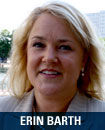JPMorgan Chase vice president of global travel Erin Barth
brought newfound savings and security to her company by taking control of a
segment not often managed by travel teams: corporate housing.
Like many companies, JPMorgan once considered long-term
stays—relocations, internships, projects, training groups and the like—a
separate function from traditional travel management. The banking giant owned
its own apartments and used internal staff to manage the bookings and leases.
Recently, however, the company decided to sell those apartments and eliminate
that staff, leaving a void in long-term stay management that Barth and her team
were happy to fill.
 "A lot of times you see this housed in the human
resources world, and people are just given lump sums, but increasingly HR is
working in conjunction with travel," Barth said. "This is a new
trend, and we're ahead of it."
"A lot of times you see this housed in the human
resources world, and people are just given lump sums, but increasingly HR is
working in conjunction with travel," Barth said. "This is a new
trend, and we're ahead of it."
Barth and her team's first step was to get a handle on the
segment's size. In examining corporate card and booked data and identifying
rogue spending, they found opportunities in the category that went well beyond
what traditionally had been considered. At first they looked at stays that
averaged at least 30 days, but decided seven days was a good fit for most
markets.
They also looked at industry benchmarking data, not just
through corporate travel sources but also groups like the Corporate Housing
Providers Association, the Society for Human Resource Management and the Forum
for Expat Management. "Some people don't even know about these, but they
are a wealth of resources and knowledge," Barth said.
The next step was selecting providers via a global
request-for-proposals process. The firm negotiated fixed pricing for studio,
one- and two-bedroom apartments in most global markets. Moving travelers on
long-term stays from hotels to apartments brought cost savings to JPMorgan, but
Barth also highlighted the benefits to the travelers—larger living spaces, full
kitchens, health clubs and "homey" amenities.
"We really honed in on the customers who are using this
in the firm and educated them on the benefits of utilizing apartments, the
cleaning facilities, the gym facilities and the housekeeping facilities, and
why it made more sense," she said. "We also did a whole cost analysis
on things to show them what their business was currently paying and how much
they would save by using this. We sold it internally and there was a great
response."
In addition to its own program, JPMorgan negotiates on
behalf of third parties with which it works, taking advantage of its own volume
and rates, Barth said.
Hotels also have taken notice. Last year, Barth said she saw
more hotels keen to keep their business away from their corporate housing and
extended-stay competition by offering extended-stay rates and price-inclusive
amenities through the Global Business Travel Association RFP tool. Some hotels,
for example, offered extended-stay rates coupled with free Internet, discounted
dry cleaning and breakfast options.
JPMorgan decided that Barth would centrally manage the
corporate housing program, but in each region, sales representatives can work
with the regional travel manager when necessary.
"We have local representation, but it rolls up to a
global tracking program and standardized rates," she said. "We don't
want to have people negotiating out there on their own without us knowing what's
going on."
Booking also is centralized and housed on the firm's travel
website, making it uniform across global regions. Employees that need lodging
for seven or more days provide their travel information via email, and the team
turns that inquiry around within 24 hours. At that point, travelers can
complete their leasing agreements and submit them to their HR manager for
approval, and the travel team processes the booking. JPMorgan's agency
generally is not involved, though it does handle some of the online bookings in
the Asia/Pacific region, Barth said.
The program can accept billing either through corporate
cards or centrally, she said. As such, the firm receives standardized reports
that detail monthly usage by line of business and cost per unit and traveler,
which senior management regularly review.
That reporting also allows JPMorgan to instantly see where
its travelers are should a disaster occur anywhere in the world, Barth said.
Security personnel also vet buildings prior to use to ensure they meet safety
standards.
Since setting up the program, Barth said she has received
inquiries from several other corporate travel teams seeking advice on corporate
housing management. In the meantime, JPMorgan's program—already one of the
biggest corporate housing programs in the world, according to its
suppliers—continues to grow. "We've gained traction year after year,"
she said, "as we continue to uncover and gain more usage as projects are
implemented."
This report
originally appeared in the Aug. 20, 2012, issue of Business Travel News.